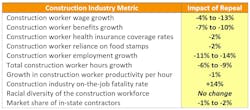Study: Repeals of Prevailing Wage Laws Cost Workers, Taxpayers
LA GRANGE, IL — Six states that repealed their prevailing wage laws between 2015 and 2018 have experienced slower construction employment, decreased wage growth, lower workforce productivity growth, increased construction jobsite fatalities, and less market share for in-state contractors, compared to states that maintained their prevailing wage laws—according to new research by the Illinois Economic Policy Institute (ILEPI) and Project for Middle Class Renewal (PMCR) at the University of Illinois at Urbana-Champaign.
Read the Study, The Economic Impact of Prevailing Wage Law Repeals on Construction Market Outcomes: Evidence from Repeals Between 2015 and 2018.
Prevailing wage laws establish minimum wages and workforce development contributions for workers on publicly funded construction projects like roads, bridges, and schools. They are based on what workers in the local community are most often paid for comparable work.
As of January 2023, a total of 28 states plus the District of Columbia have prevailing wage laws covering state and local construction expenditures, with federal projects governed by the Davis-Bacon Act.
Between 2015 and 2018, Indiana, West Virginia, Kentucky, Wisconsin, Michigan, and Arkansas each repealed their state prevailing wage laws. In this study, ILEPI and PMCR researchers examined pre-repeal and post-repeal data from the U.S. Census Bureau (2012 and 2017) and the Bureau of Labor Statistics (2014 and 2019) to compare construction market outcomes in the recent repeal states against those that maintained their prevailing wage laws.
Overall, the data linked repeal with 4%-13% percent slower income growth for construction workers alongside a decrease in health insurance coverage, an increase in food stamp reliance, and a 14% higher on-the-job fatality rate. Construction worker productivity also fell behind in the repeal states.
“Pro-repeal governors and state legislatures promised that repeal would grow their state economies and deliver savings for taxpayers,” said ILEPI Executive Director and study coauthor Frank Manzo IV. “There is zero real-world evidence that any such benefits ever materialized, and this study details how repeal has had the added impact of undermining job quality for the construction workforce.”
Researchers noted that 17 of the last 20 peer-reviewed academic studies (85%) from respected economists have concluded that prevailing wage laws have no effect on overall construction costs because labor comprises such a low share of overall project expenditures. Additionally, contractors tend to offset market-rate wages with savings tied to higher workforce productivity, improved safety outcomes, and more efficient use of fuels and materials.
Recent analyses of pre- and post-repeal project costs in the states of Indiana, Wisconsin, and West Virginia have reached similar conclusions, and have also found that the repeals failed to increase bid competition on public works projects.
“While paying below-market rate wages fails to save taxpayer dollars on public projects, it does often translate into more safety problems on jobsites, a less reliable supply of the skilled workers to build and maintain critical infrastructure, and more construction workers reliant on welfare programs,” added study coauthor Dr. Larissa Petrucci. “Worse, the data shows that repeal states are collectively shrinking the market share of their own local construction businesses by billions of dollars each year, while stifling job growth in this critical sector of the economy by as much as 14%.”
With the U.S. Congress recently approving trillions of dollars in new infrastructure investments, contractors across the country struggling with labor shortages, and inflation shrinking the value of workers’ paychecks, researchers encouraged repeal states to reconsider their prevailing wage policies.
“Prevailing wage laws strengthen the construction industry as an engine of economic growth, boost job quality, and improve the labor market competitiveness of these in-demand careers,” added University of Illinois at Urbana-Champaign professor, PMCR Director, and study coauthor Dr. Robert Bruno. “Repeal of prevailing wage fails to save taxpayers any money. Worse, it creates unnecessary and counter-productive hardships for blue-collar workers struggling to keep up with rising costs, for construction firms struggling to win bids and attract qualified craft professionals to fill open positions, and for the communities relying on both to get build vital public infrastructure projects right, on-time, and safely.”



